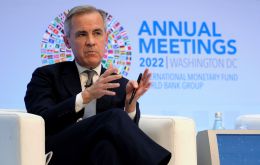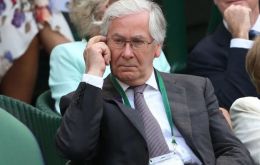MercoPress. South Atlantic News Agency
Tag: Bank of England
-
Thursday, March 23rd 2023 - 10:20 UTC
With prices continuing to rise, Bank of England expected to increase the basic rate to 4,25%

Following a surprise rise in UK consumer prices, the Bank of England is expected to increase interest rates for an 11th consecutive. Analysts think an increase in the Bank rate from 4% to 4.25% is the most likely outcome of the Monetary Policy Committee Thursday meeting later.
-
Monday, March 20th 2023 - 16:05 UTC
Network of leading Western central banks ready to inject the necessary dollars liquidity

Leading central banks of the West announced on Sunday a coordinated action to provide liquidity to the financial system through the US swap liquidity line arrangements. The statement was signed by Secretary of the Treasury Janet L. Yellen and Federal Reserve Board Chair Jerome H. Powell and becomes effective Monday 20 March.
-
Tuesday, March 14th 2023 - 13:51 UTC
Following the failure of Silicon Valley Bank, the Fed and BoE have issued statements

The Federal Reserve Board on Monday announced that Vice Chair for Supervision Michael S. Barr is leading a review of the supervision and regulation of Silicon Valley Bank, in light of its failure. The review will be publicly released by May 1.
-
Tuesday, February 14th 2023 - 10:16 UTC
UK economy, Brexit and the productivity slowdown controversy

Jonathan Haskel, an external member of the Bank of England monetary policy committee, said a wave of investment “stopped in its tracks” in 2016 following the Brexit vote.
-
Friday, February 3rd 2023 - 10:15 UTC
Bank of England raises main rate to 4%, but anticipates a shallower recession

The Bank of England Monetary Policy Committee on Thursday voted 7-2 in favor of hiking interest rates by 50 basis points with the main rate now at 4%. However the MCP indicated in its statement that smaller hikes and an eventual end to the hiking cycle may be in the cards in coming meetings. The two dissenting members voted to leave rates unchanged at this meeting.
-
Tuesday, December 20th 2022 - 08:44 UTC
New banknotes depicting King Charles III unveiled

The Bank of England has released specimens of the new bills portraying King Charles III instead of his mother, the late Queen Elizabeth II, which are due to enter circulation in mid-2024.
-
Saturday, November 5th 2022 - 09:48 UTC
Ex BoE governor blames much of UK's economic challenges on Brexit

Former Bank of England governor, Mark Carney said that the fall in the pound and shrinking economy after the UK left the European Union, Brexit, had added to “inflationary pressure”.
-
Wednesday, November 2nd 2022 - 09:17 UTC
Bank of England begins QE “tightening”; first successful sale of £750 million bonds

The Bank of England sold on Tuesday £750 million worth of UK government bonds from its quantitative easing stockpile. It was the first Western central bank to do so and received a solid demand from investors at its first auction to sell government bonds from its £838 billion pound quantitative easing portfolio.
-
Thursday, October 27th 2022 - 10:16 UTC
UK's Autumn's budget delay to Nov 17, leaves BoE on the dark as to interest rate increase next week

Since British Chancellor of the Exchequer Jeremy Hunt pushed back this year's autumn statement (expected “mini budget”) --from Halloween to 17 November--. Bank of England who are meeting on 3 November have been left without guidance as to the government's tax and spending policies.
-
Tuesday, October 25th 2022 - 09:10 UTC
UK faces an era which could be more difficult than 2008, Lord King, ex BoE governor

Lord Mervyn King, governor of the Bank of England from 2003 to 2013 said the United Kingdom faces an era of much austerity to stabilize the economy, with the average person having to face “significantly higher taxes” to fund public spending.
